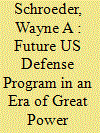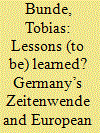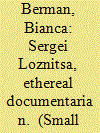|
|
|
Sort Order |
|
|
|
Items / Page
|
|
|
|
|
|
|
| Srl | Item |
| 1 |
ID:
192577


|
|
|
|
|
| Summary/Abstract |
The Great Power Competition requires a new defense posture that adapts to the exigencies of the Russia-Ukraine war and the rise of China. A successful defense posture will necessarily require a reexamination of US defense strategy, and, importantly, the level of resources devoted by the US and its allies to national defense. A defense real growth commitment should be initiated now and sustained for as long as this more competitive and threatening security environment remains in place
|
|
|
|
|
|
|
|
|
|
|
|
|
|
|
|
| 2 |
ID:
186560


|
|
|
|
|
| Summary/Abstract |
In Germany, the Russian war on Ukraine is widely perceived as a “Zeitenwende,” a watershed moment undermining key foreign policy beliefs. Despite mounting evidence contradicting them, German elites previously failed to adapt core beliefs regarding Russia and the use of force because these beliefs were not only deeply embedded in largely uncontested identity constructions but also shaped the definition of economic interests, which in turn made ideational adaptation more costly. Moreover, Germany’s extraordinarily beneficial geopolitical situation in the post-Cold War era meant that the country could afford not to learn. Although the “Zeitenwende” will trigger significant change, it is unclear which lessons exactly Germans will now be learning and how far that adaptation will go. Given Germany’s key position in Europe and its previous role in shaping the European and transatlantic policy toward Russia, the results of these learning processes will significantly shape the emerging European security order.
|
|
|
|
|
|
|
|
|
|
|
|
|
|
|
|
| 3 |
ID:
192086


|
|
|
|
|
| Summary/Abstract |
Since early 2023, China has sought to play a more active crisis resolution role in the Russia-Ukraine war, marking a shift in Chinese behaviour on the conflict. What explains China’s pursuit of this role, an agenda that has been described as a ‘fool’s errand,’ not least because of the seeming difficulties of real peace between Kyiv and Moscow without one side capitulating to the other? One interpretation is that China’s behaviour is part of a broader trend of ambitions to play a bigger role in addressing global hotspots and project itself as a responsible power. It parallels Beijing’s involvement in brokering the Saudi-Iran rapprochement as well as attempts to mediate in the Israeli-Palestinian conflict. Yet, such ambitions are only part of the story. There are more contingent considerations behind the subtle but distinct change in Chinese positioning on the war. Far from being a ‘fool’s errand,’ Beijing’s peacemaker posturing is borne out of calculations taken to minimise risks to Chinese interests as a consequence of the war. Taking into account documentary sources and views from China, this article unpacks those calculations to provide a fuller explanation behind the shift in Chinese behaviour.
|
|
|
|
|
|
|
|
|
|
|
|
|
|
|
|
| 4 |
ID:
192657


|
|
|
|
|
| Summary/Abstract |
On 24 February 2022, Russia launched a full-scale invasion of Ukraine in a major escalation of a war that had been persisting since 2014. This article explores three of Sergei Loznitsa’s films set in Ukraine and examines the way in which their shared observational style informs the Russia-Ukraine war and may influence viewers’ perceptions of the complexities of the conflict. A close analysis reveals that the observational mode used in Maidan (2014), Donbass (2018), and The Kiev Trial (2022) has two primary effects. First, in Donbass and The Kiev Trial, the unfiltered style serves as a contrast to the often farcical and ‘staged’ content, thereby exposing the lies underpinning Soviet presence in Ukraine and the current Russian invasion. Second, in addition to exposing Russian misinformation, Loznitsa’s observational style in Maidan and Donbass facilitates identification with the Ukrainian people by visually and auditorily immersing the viewer in the world on the screen. The article concludes with a discussion of the significance of Loznitsa’s work in shaping the public’s perception of – and continued commitment to – the war in Ukraine.
|
|
|
|
|
|
|
|
|
|
|
|
|
|
|
|
| 5 |
ID:
186558


|
|
|
|
|
| Summary/Abstract |
This article explores Russia’s attack on Ukraine using the lens of strategic culture. Specifically, two strands in Russian strategic culture are identified. The first is a deep-seated sense of vulnerability, especially vis-à-vis “the West.” To counter this perceived threat, Russia’s national security establishment has long emphasized the importance of possessing strategic depth and buffer zones. The second strand revolves around a feeling of entitlement to great power status. A central component in Russia’s great power vision is the right to have a sphere of influence in its Eurasian neighborhood. The article shows that Kremlin officials perceived Ukraine’s drift toward the West as a major threat to both Russia’s security interests and its status aspirations. As a result, Russia’s rhetorical milieu regarding Ukraine became increasingly radicalized. The article concludes that this provided the discursive and intellectual habitat that enabled Putin to launch a large-scale attack.
|
|
|
|
|
|
|
|
|
|
|
|
|
|
|
|
|
|
|
|
|